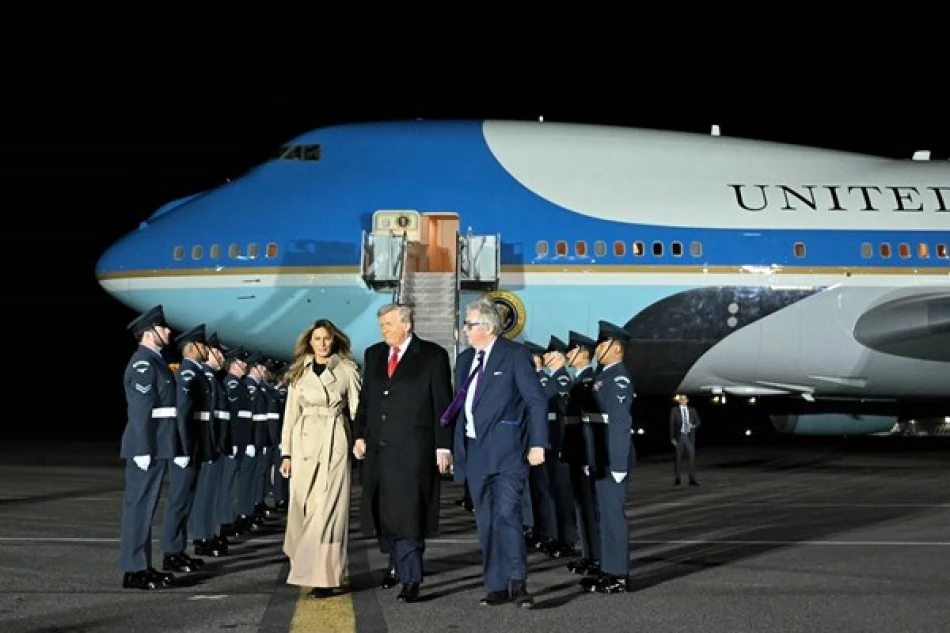
Trump Embarks on Official State Visit to the UK, Diplomatic Spotlight Intensifies
Trump's UK State Visit Eyes Multi-Billion Dollar Tech Deal Amid Transatlantic Reset
President Donald Trump has arrived in the United Kingdom for a carefully choreographed state visit that British officials hope will culminate in a landmark technology agreement worth billions of dollars, signaling a renewed commitment to the "special relationship" between Washington and London. The two-day diplomatic mission comes at a critical juncture as both nations seek to strengthen economic ties amid global technological competition, particularly with China.
Royal Treatment and Strategic Timing
The visit follows traditional state visit protocols, complete with horse-drawn carriages, military honor guards, and an elaborate dinner at a thousand-year-old castle. King Charles III will host Trump at Windsor Castle on Wednesday, followed by substantive policy discussions with Prime Minister Keir Starmer at the countryside retreat "Chequers" on Thursday.
This pageantry serves a strategic purpose beyond diplomatic courtesy. The timing coincides with America's upcoming 250th anniversary celebrations, providing both leaders with a symbolic backdrop to frame their relationship as historically rooted yet forward-looking.
The Technology Partnership Gambit
Beyond Traditional Trade Deals
Unlike previous transatlantic agreements focused on manufacturing or finance, this potential technology pact reflects both countries' recognition that digital infrastructure, artificial intelligence, and cybersecurity capabilities will define economic competitiveness in the coming decades. The UK has positioned itself as a global fintech hub, while the US maintains dominance in big tech platforms and semiconductor innovation.
Market Implications and Investor Interest
A multi-billion dollar tech agreement could significantly impact both nations' technology sectors. British tech companies could gain enhanced access to American venture capital and Silicon Valley networks, while US firms might benefit from the UK's more flexible regulatory environment for emerging technologies like AI and digital assets. This partnership model echoes successful collaborations between the US and other allies, such as the CHIPS Act partnerships with South Korea and Japan.
Geopolitical Context and Strategic Calculations
The emphasis on strengthening US-UK ties comes as both nations navigate complex relationships with China and seek to reduce technological dependencies. The visit occurs against the backdrop of ongoing global supply chain vulnerabilities and intensifying competition in critical technologies including quantum computing, 5G networks, and renewable energy systems.
Prime Minister Starmer's Labour government has signaled its intention to balance economic pragmatism with security concerns, particularly regarding Chinese investment in British infrastructure. A robust technology partnership with the US could provide alternative pathways for innovation funding and development.
Historical Precedent and Future Prospects
The British government's framing of the relationship as built on "250 years of history" deliberately invokes the post-Revolutionary War reconciliation that eventually produced the world's most enduring alliance. However, modern challenges require updated frameworks. Previous technology collaborations, such as the AUKUS submarine partnership including Australia, demonstrate how traditional alliances can adapt to address contemporary strategic needs.
The success of this visit will likely be measured not in ceremonial gestures, but in concrete commitments that enhance both nations' technological sovereignty while maintaining their competitive edge in global markets. For investors and policymakers watching transatlantic relations, the outcomes could signal whether the "special relationship" can evolve beyond historical sentiment into practical economic partnership for the digital age.
Most Viewed News

 Layla Al Mansoori
Layla Al Mansoori






